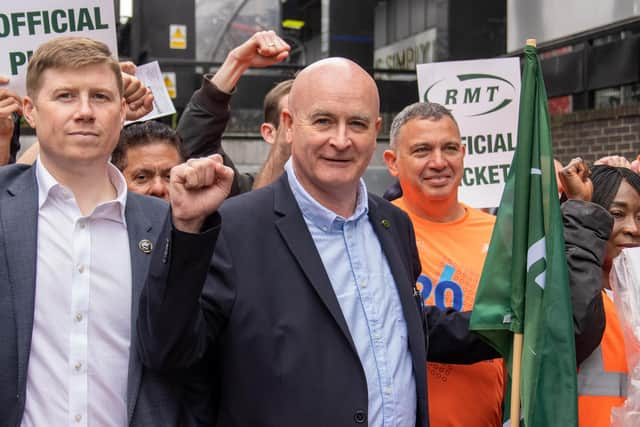Rail strikes: SNP and Labour should learn from RMT's Mick Lynch, a new hero arising in troubled times – Joyce McMillan
On Wednesday, after the first strike day, a Savanta Com/Res poll found that 58 per cent of those questioned believed that the strike was justified, and even more blamed the government for not doing more to prevent it.
And although other polls have shown a more typical anti-union majority, there’s still a sense that that majority is beginning to dwindle and shift in ways that are evidently surprising both to Conservative politicians, and to those who, in recent decades, have unthinkingly absorbed much of their world-view.
Advertisement
Hide AdAdvertisement
Hide AdAccording to a growing army of fans, of course, just one man is largely responsible for this perceptible change of atmosphere around striking workers.
That man is Mick Lynch, general secretary of the RMT; and all week his media appearances have been greeted like manna from heaven – or at least an oasis in the desert – by those sick of hearing well-paid politicians and commentators pussy-foot around the colossal wealth gaps that have developed in Britain in recent decades, and the shocking emergence of a new class of full-time workers, millions strong, who cannot support their families on what they are paid, but must instead rely on state benefits and food banks.
Mick Lynch is an incisive speaker on behalf of organised workers, well armed with facts, confident in the support of his members, and completely unphased by the babble of bourgeois outrage and half-digested Tory disinformation presented by most of his opponents in debate; and he has played brilliantly to those strengths this week, speaking truth to power in memorably fearless style.


If the hour has produced its man, though, it has to be said that there have been many signs, recently, that Britain’s staggeringly over-entitled boss class might be beginning to overplay its hand.
During the pandemic lockdowns, the nation received a brief but rigorous lesson in whose work is really essential to our survival; and the answer was not bankers, or city executives, or any member of that CEO class who – in Britain – typically expect to be paid an astonishing 60 times as much as the median worker in their organisations.
The essential people, it turned out, were delivery drivers, transport workers and cleaners, those involved in food production and supply, those who keep our power and water systems going, and those who deliver health care and other basic care services.
It was therefore unlikely, once things began to return to “normal”, that ordinary citizens across Britain would be all that impressed by a government which stood on doorsteps applauding those workers, but then coolly informed them that the magic money tree which delivered tens of billions to companies close to the government during lockdown had suddenly been felled again, and that they would not be receiving any significant pay increases in the immediate future.
For that government then to preside over a massive inflation hike partly driven by unregulated corporate greed, while simultaneously allowing further pay rises for MPs (whose pay has risen by almost 30 per cent during the past decade), making no comment on another surge in CEO pay, and talking this week of lifting curbs on the remuneration of already wealthy city bankers, was much less than sensitive.
Advertisement
Hide AdAdvertisement
Hide AdThe final straw, though, may have been the colossal brass neck of assorted members of this British boss class – after a post-crash decade of shocking impunity, greed and self-enrichment on their part – in coming out to argue that ordinary workers in this latest crisis should not organise, should not strike, and should instead be helping to prevent a “wage-price inflation spiral” by showing voluntary pay restraint in the public interest.
In any political system, such breathtaking double standards – such moralising for the masses, and immorality from the bosses – can only go so far without provoking a backlash; and if the British worm is about to turn, it is certainly not before time.
If that worm truly turns, of course, then it will change everything in British and Scottish politics; and it would be a fine thing if it were public opinion, in the end, that forced Labour “moderates” like Keir Starmer, long given to half-apologising for the party’s trade union links, both to change their policies on addressing British workers’ declining share of the national wealth, and to follow one MP this week in proudly identifying the union funding on which the Labour Party is founded as “the cleanest money in British politics”.
On balance, I suppose the chances of that must still be rated as small; great swathes of the British middle class still seem lost in that world of snobbery and wealth-worship where worthless cash-shifting City types flaunting giant bonuses are the “nice people” they hope their children will marry, while train guards and hospital porters seeking a living wage are both nasty and greedy.
This week, though, offered us a glimpse of a possible different world, where the UK once again becomes a country fit for workers to live in; and that brief alternative vision presents a radical challenge to all our mainstream parties. Not only, that is, to the clapped-out and increasingly chaotic Tories who have brought this crisis on themselves; but also to the timid social democrats of the SNP and Labour, who may, like Mick Lynch, will the same end of a much fairer society, but who so often seem afraid to will the means.
Comments
Want to join the conversation? Please or to comment on this article.

